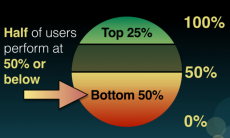Today’s interview is with Ted Ulle, the Senior Search Analyst for Converseon, and an administrator at Webmaster World (tedster), one of the foremost online forums for organic search optimization. He is a pioneer in search marketing, having entered this emerging field in 1996 on a foundation of twenty years as a turn-around specialist in multi-channel retail marketing. He is also a senior editor for Search Engine Marketing Journal, the only peer-reviewed, academic publication for the search marketing industry. He speaks frequently at industry conferences, including PubCon where he also serves on the advisory board. He will be speaking next week at PubCon South in Austin, offering a solo Spotlight Session on information architecture. I have worked with Ted at Converseon the last two years and I am sure that you’ll be interested in his views on how search spam has suddenly become front-page news.
Me: It’s amazing to me how SEO has moved from this virtually unknown profession to something that regularly hits the front pages of the New York Times and the Wall Street Journal. Why do you think these formerly “inside baseball” techniques have suddenly become mainstream news?
TU: The short answer: There’s a lot of money on the table. Soon after major enterprise learned the value of SEO to their own bottom line, the media began to wake up to the idea. Note, for example, that recent coverage from CNN happened in their “Money” section, and not as a “Technology” story.
Me: These stories seem to have taken a turn lately. While they still demonize cheating marketers, they also seem very critical of Google, don’t you think?
TU: There does seem to be a hint of propaganda to the whole thing, don’t you think? Especially in light of the legal scrutiny coming from the European courts, it pays not to take it all at face value.
In the US, long established media have been complaining about the pinch that Google’s success is creating for them. Just a little over a year ago Rupert Murdoch was talking about removing all his Web sites from the Google index. So I repeat: There is a LOT of money on the table. Everyone saw what the Web did to music publishers, and no one wants to passively watch their own industry take a parallel nosedive.
Me: You had your own brush with fame last week when the Wall Street Journal publicized some dubious SEO techniques used by Overstock.com. How were you involved in that story?
TU: The Journal’s story mentioned the Google SEO forum that I moderate on WebmasterWorld.com. I’m also an administrator there and help set policy. In January, I made an exception to our usual rule of not looking at the techniques of any specific Web site. That policy protects the forum community from being flooded with promotional posts. It also stops us from being leveraged as a way to damage competitors.
But that policy can also make discussion awkward—and the community felt that we needed to talk about specifics some times, and not just talk about generic “widgets” at “example.com.” So I approved a public discussion that looked at Overstock.com, examining their success in the search results. And we did find many solid examples of SEO best practices.
We also found a college discount program for new students. In that program, Overstock requested certain keywords as the clickable links (anchor text) if the discounts were publicized on the university’s EDU website. This does sound suspiciously like “buying links”—a practice that definitely violates Google’s published guidelines. However, the discount program was offered to students whether those links were placed online or not. There was no quid pro quo, in other words.
Dave Harry, an independent SEO consultant who was credited in the original WSJ article, confirmed that the penalty did not occur because of anything Webmaster World published. Instead, there was another unreported Overstock activity that caused the Google penalty.
Writing on WebmasterWorld under his screen name (thegypsy), Dave Harry said this:
“I can confirm this, but I cannot give details as it was given to me <off the record>. And I can also confirm that the other item they were caught doing is most CERTAINLY in violation of the Google guidelines.
“I was also confused somewhat as there was no ‘smoking gun’ with the EDU stuff. I’ve gotten clarification and most certainly ANY website would have been nuked if caught doing what they were. I wish I could tell you more, but I respect my sources.”
Me: Given your role as a consultant as well as a moderator on Webmaster World, I would think that sometimes you have to walk your own ethical line as to what you are willing to do. Did you feel any conflicts as this story unfolded?
TU: It’s been quite painful. I have professional commitments to the entire community at WebmasterWorld, to my clients, and to my contacts in the SEO industry—that includes Dave Harry. I also want the full truth of the situation to be publicly known, because the current information has confused many SEOs.
I hated the idea that my decision might have caused the whole episode. The Google penalty will clearly lose Overstock and their employees a lot of revenue. Some people even suspected that I intentionally created all of this public exposure—which is most definitely not the case.
Me: As someone known for the highest ethical standards in an industry where some people cut corners, does it make things uncomfortable in some situations?
TU: It certainly does. I’ve learned that I need to maintain my own ethical standards but without being offensively judgmental about others. SEO is a young and fluid marketing profession. Absolute lines are difficult to find, and even when you think you’ve found one, it has a way of shifting over time.
When it comes to ethics, it’s important to appreciate that search engine guidelines are not legal restrictions, such as laws about hacking Web servers. Guidelines are essentially business Terms of Service. Step outside those guidelines and you can lose a lot of business for a client—and not damaging a client’s business is clearly an ethical responsibility for any marketer.
Search engines also rewrite their guidelines over time—what was acceptable ten years ago can bring a world of trouble today. So any SEO needs to work hard to stay current. I can say that I never sanctioned a technique that later became a guidelines violation… so far. In an industry where things change so fast, there’s always a chance.
Me: What advice do you give clients who might be inclined to cut corners?
TU: I always advise working for long term, sustainable success. Cutting corners works against both those goals. That means I always inform clients of the potential downside to any idea, and I will not help in any deceptive efforts.
Me: Given that people are constantly thinking of new tactics in SEO, how can you know whether any particular technique is black hat, gray hat, or white hat?
TU: I’ve heard you summarize it very nicely, Mike. Any SEO action needs to benefit the Web site itself, the search engine, and the search engine user. If any action does not generate that three-way win, then it is immediately suspect.
Me: How do you advise a client that has been ensnared in dubious SEO activity and now wants to “go straight”?
The first step is to reverse any deceptive action that you possibly can. The second step is to contact any search engine whose guidelines you’ve violated. Explain what you did, what you fixed, and anything you may not have been able to fix. Then request reconsideration of any penalties. At that point, you wait out your period in the penalty box, however long that may be.
During that time, you undertake a very full-featured audit of your Web site and bring it up to a fine-tuned level. The irony here is that a high-profile business almost always has all the links it needs to do very well in search, IF they are willing to address both their Web technology and their team’s internal processes. By improving your business process for the digital age, you build a well-oiled machine that can generate long-term and sustainable success.
Me: With the advent of social media’s impact on SEO, do you think that will lessen spam techniques or just drive them into new social spamming tricks?
TU: Social media spamming is already happening. Technology has given us ways to do many things much more easily. But there’s always the temptation to think that SEO should be made push-button easy. That mindset can lead to cutting corners and to deception, and we are already seeing it in social media. There are networks of fake Twitter accounts, as well as reviews generated by bots instead of by real people. There’s quite an elaborate bag of tricks already in use, which means social media sites need to develop a lot of protective technology, just as search engines and email providers have already been doing for years.
Me: We hear many pronouncements lately that SEO is dead or that SEO is just spamming. What do you see as the future of SEO?
TU: SEO will enjoy a long future. It is essentially a form of marketing, tuned up to the digital age. SEO as technical trickery may be around for a while, too. But when deception is the end product there’s a serious limit to its value.
The future of SEO as authentic technical marketing is much more expansive than just dealing with bits and bytes of code. It is already evolving, integrating productively with disciplines such as social media and market intelligence. One major growth area for today’s SEO consultant is in consulting for corporate change.
Businesses are often structured in a way that creates barriers for the full use of what SEO understands. This means internal processes need to become agile and fluent, more cross-disciplinary. Business process governance needs to step up its game, so that digital marketing is ready to leverage this moment—not last year’s moment. The SEO professional is in a perfect position to see current process obstacles and guide each business to find their unique way forward.
Me: Thanks so much Ted for taking this time to share your expertise with our readers.






